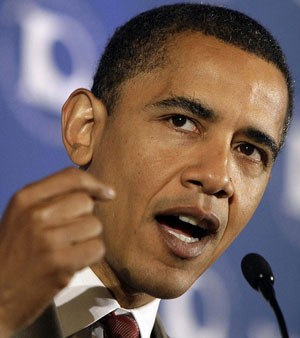Obama wrestles with next steps in Afghanistan
 Washington - US President Barack Obama is holding another round of meetings with top advisors this week to plot out his next steps in Afghanistan and Pakistan as the debate over the best approach heats up.
Washington - US President Barack Obama is holding another round of meetings with top advisors this week to plot out his next steps in Afghanistan and Pakistan as the debate over the best approach heats up.
Obama is said to be evaluating a number of options for waging the increasingly bloody conflict against the Taliban and al-Qaeda, which enters its ninth year on Wednesday, and the issue appears to have produced some divisions within the administration.
Differences were highlighted in the last few days as Obama officials responded to remarks made by his top commander in Afghanistan, General Stanley McChrystal, during a speech in London last week.
McChrystal warned of the deteriorating situation in Afghanistan and said more troops are needed even though Obama has yet to address his reported request for an additional 40,000 troops. McChrystal also said any plan that would scale back the counterinsurgency operation to a more precise strategy to target al-Qaeda would be "shortsighted."
Vice President Joe Biden's office has reportedly advocated the latter approach, partly over concerns Afghan President Hamid Karzai's apparent re-election was fraudulent and the United States shouldn't be seen as defending a government viewed by the people as illegitimate.
McChrystal's comments prompted Defence Secretary Robert Gates and Obama's national security adviser, James Jones, to make it clear to civilian and military leaders that any advice provided to the president should remain private and in the chain of command until a final decision is rendered.
"Ideally, it's better for military advice to come up through the chain of command," Jones said in an interview with CNN on Sunday.
Gates, speaking alongside Secretary of State Hillary Rodham Clinton at George Washington University on Monday night, told an audience that he agreed with McChrystal's assessment that the situation in Afghanistan is "serious and deteriorating" but advice to Obama needs to be kept behind closed doors.
"The president deserves the candid advice of his senior advisers, both civilian and military, but that advice should be private," Gates said.
Meanwhile, Obama has been targeted by Republican critics who have questioned his resolve in Afghanistan and for his slow response to McChrystal's request for more soldiers. Clinton responded by saying the White House needed to come up with a deliberate strategy and avoid making "a snap decision."
The US death toll in Afghanistan during the last year has been the highest since the war began on October 7, 2001, weakening support for it with the American public. The United States and NATO allies have been unable to defeat a resurgent Taliban, which has stepped up cross-border attacks from Pakistan.
Shortly after taking office, Obama ordered an additional 21,000 troops to Afghanistan, raising the American presence to more than 60,000. Gates has not said whether he support more forces, but acknowledged that the failure to deploy more troops to Afghanistan earlier has allowed the Taliban to get back into the fight.
"Because of our inability and the inability, frankly, of our allies, to put enough troops into Afghanistan, the Taliban do have the momentum right now," Gates said. dpa